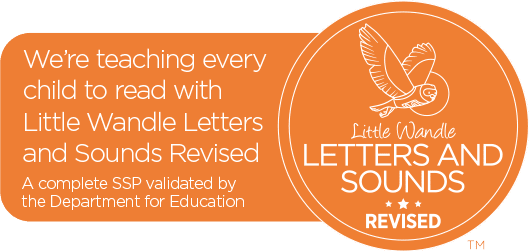Phonics and reading

We are delighted with our new systematic, synthetic phonics programme, Little Wandle. There have been lots of changes in school and this page has lots of useful resources to help support your child's learning at home.
NURSERY AND RECEPTION PHONICS
Click the link below to visit our phonics overview from our Little Wandle Phonics Programme.
Little Wandle Phonics Overview for Reception
Year 1 Phonics
Click the link below to visit our phonics overview from our Little Wandle Phonics Programme.
Little Wandle Phonics Overview for Year 1
Reception Phonics Support Autumn
For further help with phonics, please click the links below for a pronunciation guide for Autumn 2022.
Little Wandle Pronunciation Guide Autumn Term 1
Little Wandle Pronunciation Guide Autumn 2
Watch the video below to learn the phase 2 sounds taught in Autumn half-term 1.
//www.youtube.com/embed/-ZtjFIvA_fs#t=0.5
Watch the video below to learn the phase 2 sounds taught in Autumn half-term 2.
//www.youtube.com/embed/qDu3JAjf-U0#t=0.5
Year 1 Phonics Support Autumn
For further help with phase 5 phonics, please click the links below for a pronunciation guide for Autumn 2022.
Little Wandle Pronunciation Guide Phase 5
Watch the video below to learn the phase 5 sounds taught in year 1.
//player.vimeo.com/video/742982775?title=0&byline=0&loop=1#t=0.5
How is Phonics Taught at NSC?
The videos in this section show parents how we teach your child specific aspects of phonics in class.
Alien Words
//player.vimeo.com/video/742989497?title=0&byline=0&loop=1#t=0.5
Tricky Words
//player.vimeo.com/video/742989066?title=0&byline=0&loop=1#t=0.5
Blending
//www.youtube.com/embed/IL5YUCPyC5I#t=0.5
Teaching Phase 5
//player.vimeo.com/video/743021918?title=0&byline=0&loop=1#t=0.5
Supporting Reading at Home
Supporting your child with reading
Although your child will be taught to read at school, you can have a huge impact on their reading journey by continuing their practice at home.
There are two types of reading book that your child may bring home:
A reading practice book. This will be at the correct phonic stage for your child. They should be able to read this fluently and independently.
A sharing book. Your child will not be able to read this on their own. This book is for you both to read and enjoy together.
Reading practice book
This book has been carefully matched to your child’s current reading level. If your child is reading it with little help, please don’t worry that it’s too easy – your child needs to develop fluency and confidence in reading.
Listen to them read the book. Remember to give them lots of praise – celebrate their success! If they can’t read a word, read it to them. After they have finished, talk about the book together.
Sharing book
In order to encourage your child to become a lifelong reader, it is important that they learn to read for pleasure. The sharing book is a book they have chosen for you to enjoy together.
Please remember that you shouldn’t expect your child to read this alone. Read it to or with them. Discuss the pictures, enjoy the story, predict what might happen next, use different voices for the characters, explore the facts in a non-fiction book. The main thing is that you have fun!
//player.vimeo.com/video/743027301?title=0&byline=0&loop=1#t=0.5

